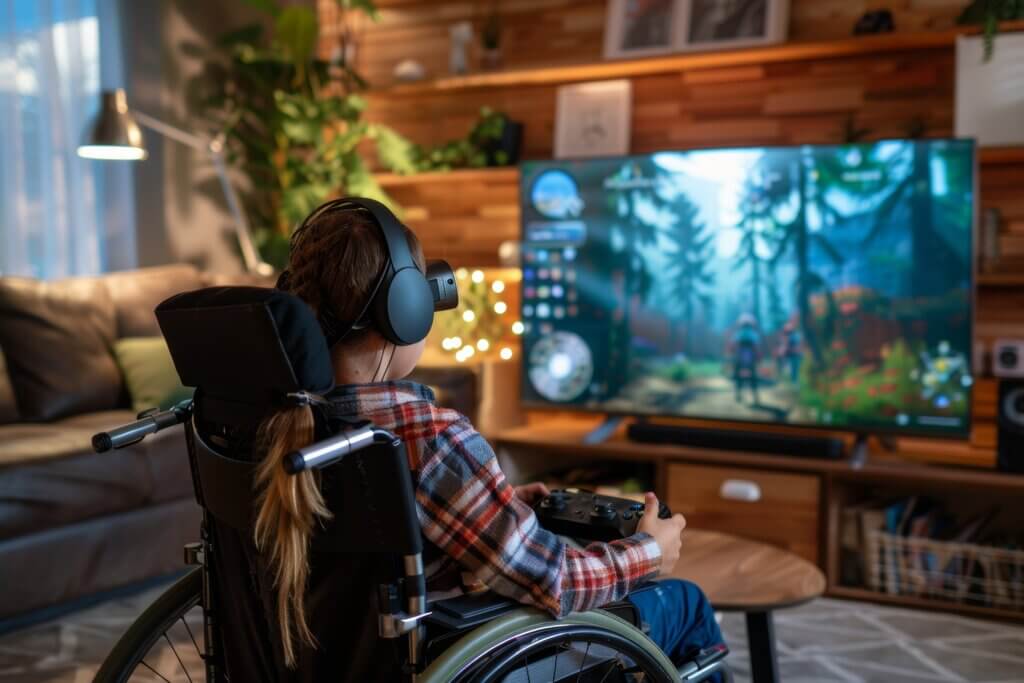
The technological advancement of videogames from the early days of the Atari 2600 or Nintendo Entertainment System of the 70’s and 80’s have advanced by leaps and bounds to our current generation of Xbox, PlayStation and Nintendo.
However, accessible and adaptive controls for those with physical disabilities have a tendency to lag behind. Thankfully, in recent years, that trend has started to change and now all major platforms have recognized the desire for those unable to operate a standard controller to join the fun. Microsoft’s Xbox Adaptive Controller, Sony’s Access™ controller and Nintendo’s Flex Controller have provided a pathway for so many to enjoy action, adventure, strategy and even cozy farming simulators. We will detail some of the best features of each device that has worked to level the playing field.

Introduced 2018, the Xbox Adaptive Controller has paved the way for many with physical disabilities to play the games they want to with ease and customization. You may even remember their commercial during the 2019 Super Bowl. The controller is a wide platform measuring 11.5” long, 5” wide and 1” thick, from there you have 19 3.5mm ports and two USB 2.0 ports in addition to a single 3.5mm stereo headset jack. The controller features a directional pad, two large buttons and the ability to save 3 button mapping profiles, you may also connect external devices such as switches, buttons, mounts, and joysticks to create a custom controller experience that is uniquely yours. Button, thumb stick and trigger inputs can be controlled with assistive devices connected through 3.5mm jacks and USB ports. In terms of system compatibility, the Xbox Adaptive Controller works with Xbox One, Xbox series

The Hori Flex was developed for the Nintendo Switch and PCs running Windows and functions very similarly to the Xbox Adaptive control. Rather than being a traditional controller shape, the Flex Controller functions more like a port with a directional pad and 6 customizable action buttons. From there, you have the option to connect additional assistive switches and joysticks which can be connected via the auxiliary and USB ports. This allows users to customize the set up and interface to meet their individual needs. The Flex has sixteen 3.5mm ports on the front used to represent the different inputs on a standard controller. There are also two USB 2.0 ports for external inputs and one 3.5mm jack on each side used for the right and left joysticks. Finally, the Hori Flex can be attached to a stand such as a camera mount by using a ¼ inch camera screw. Widely regarded as the best option for accessible gaming with the switch, this controller will have you on Rainbow Road or exploring Hyrule with relative ease.
Finally, we have the Sony Access™ controller. Engineered for the PS5, “this versatile controller kit can be customized to meet players’ diverse needs, designed in close collaboration with the accessibility community to help players with disabilities play more comfortably for longer.” Boasting a circular design, this controller features swappable buttons and stick caps, adjustable stick length and AMPS (Attachment Mounting Pattern Standard) mount to allow a customizable experience. Additionally, you have the option to use up to two Access controllers together as a single virtual controller or connect one or both with a Sony DualSense or DualSense Edge controller to add more features like haptic feedback, adaptive triggers, motion sensor and touchpad swipe. Each Access Controller comes with 4 additional 3.5mm ports for additional customization. Another feature we find very interesting is the ability to save up to 30 individual control profiles from your console settings to ensure the most suitable control layout and button functions to accommodate different users and play styles.

The current generation of accessible controllers has come a long way and continues to evolve based on player’s needs. We celebrate these advances and the way they have made the gaming space accessible to so many gamers with disabilities. We at MobilityWorks support these efforts as they reflect our company’s mission to provide wheelchair users with the mobility, independence and personal freedom they desire.

